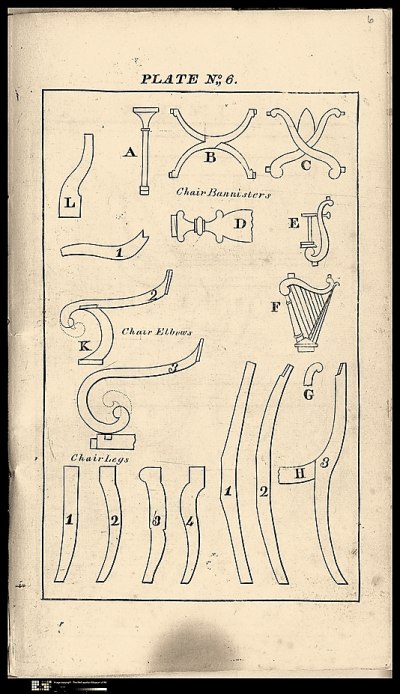 Twenty years ago if you planned to do serious research on furniture, woodworking, and other related crafts you eventually found yourself at Winterthur, Colonial Williamsburg, and a few other bastions of historic information. If you weren't an academic access to these institutions was problematic. Twenty years ago if you planned to do serious research on furniture, woodworking, and other related crafts you eventually found yourself at Winterthur, Colonial Williamsburg, and a few other bastions of historic information. If you weren't an academic access to these institutions was problematic.
At the recent show at the Metropolitan Museum of Art on Duncan Phyfe the exhibit refers to two publications I don't have in my collection. Actually most people don't have copies in their collection as both volumes are pretty darn rare.
"The New York Book of Prices for Manufacturing Cabinet and Chair Work" from 1817 and "The London chair-makers' and carvers' book of prices for workmanship, as regulated and agreed to by a committee of master chair-manufacturers and journeymen"
Twenty years ago actually getting a chance to read these books meant a road trip or hoping someone would reprint the book.
Let me save you the gas money:
The former is now available on line here.
The latter is on google books here.
The ivory tower cracks and suddenly lots of information is available to anyone who wants it. What has resulted in the past 20 years is increasing research on all branches of historic woodwork and toolmaking that previously was simply not available. There has been a flood of new information and insights. Anyone can do a little work and everyone has access to the tools at hand for evaluating the work. New eyes look at old material and have new interpretations and new connections. People trying to do things historically correctly have lots more sources to learn from.
I don't know what new insights one of you might glean from the sources I link to above, but I bet it's exciting whatever it is.
Now there is another point to consider. A scholar I know, when we discussed this evolution in research pointed out that with amateurs drawing conclusions, without the rigor of the academic world you get a lot of sloppy research. And he is right. But so what. Mendel was an amateur, Harrison was an amateur, The kid who cracked the IPhone was an amateur. We are in for a lot of sloppy research and suspect conclusions but at the same time with more and more people poring over more and more easy to access material I am sure some exciting stuff is just waiting there and will be found.
Note: I categorize all my blog entries and for this one I included "Woodworking Tools and Techniques" in addition to the obvious "Historic Subjects" category. The reason is for anyone making furniture looking through historic material IS a woodworking technique and research materials are another form of woodworking tool.
|
 Joel's Blog
Joel's Blog Built-It Blog
Built-It Blog Video Roundup
Video Roundup Classes & Events
Classes & Events Work Magazine
Work Magazine


 Twenty years ago if you planned to do serious research on furniture, woodworking, and other related crafts you eventually found yourself at
Twenty years ago if you planned to do serious research on furniture, woodworking, and other related crafts you eventually found yourself at
The other thing, though, is that folks should realize that the world still isn't all online - I've found lots of inspiring things at university libraries and the such that I haven't found online (the woodworking in Estonia book being one example, which I found interesting because I thought it was originally available through the US Dept. of Commerce or something . . . )
www.evenfallstudios.com/woodworks_library/woodworks_library.html#Hand%20Tools
As an academic who occasionally does research (not woodworking-related), I'd like to think that academia has solid safeguards against sloppy research. To be sure, the safeguards are there. But they don't always prevent sloppy research from appearing in even very well-respected venues. Amateur researchers don't have as many safeguards, but they can still produce very high-quality research on occasion.